汉语习语英译
- 格式:pdf
- 大小:263.10 KB
- 文档页数:37
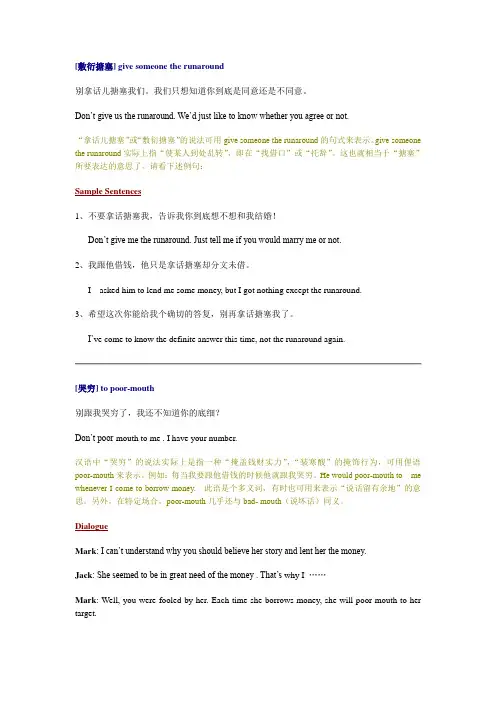
[敷衍搪塞] give someone the runaround别拿话儿搪塞我们。
我们只想知道你到底是同意还是不同意。
Don’t give us the runaround. We’d just like to know whether you agree or not.“拿话儿搪塞”或“敷衍搪塞”的说法可用give someone the runaround的句式来表示。
give someone the runaround实际上指“使某人到处乱转”,即在“找借口”或“托辞”。
这也就相当于“搪塞”所要表达的意思了。
请看下述例句:Sample Sentences1、不要拿话搪塞我,告诉我你到底想不想和我结婚!Don’t give me the runaround. Just tell me if you would marry me or not.2、我跟他借钱,他只是拿话搪塞却分文未借。
I asked him to lend me some money, but I got nothing except the runaround.3、希望这次你能给我个确切的答复,别再拿话搪塞我了。
I’ve come to know the definite answer this time, not the runaround again.[哭穷] to poor-mouth别跟我哭穷了,我还不知道你的底细?Don’t poor-mouth to me . I have your number.汉语中“哭穷”的说法实际上是指一种“掩盖钱财实力”,“装寒酸”的掩饰行为,可用俚语poor-mouth来表示。
例如:每当我要跟他借钱的时候他就跟我哭穷。
He would poor-mouth to me whenever I come to borrow money.此语是个多义词,有时也可用来表示“说话留有余地”的意思。
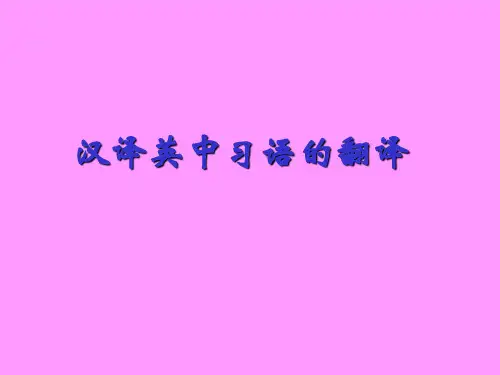
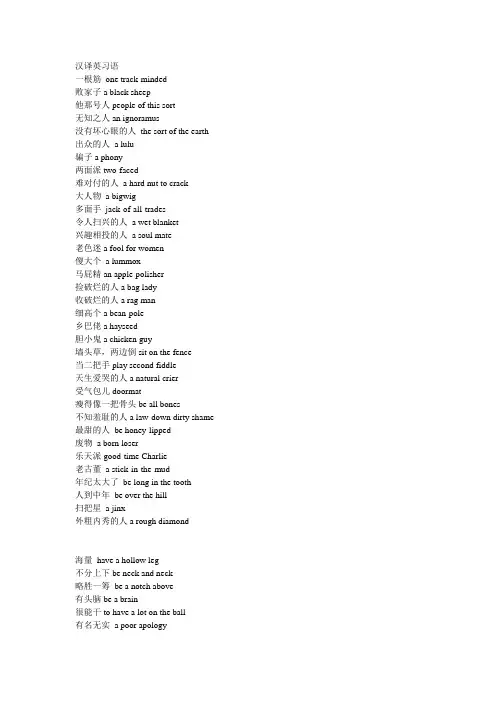
汉译英习语一根筋one track-minded败家子a black sheep他那号人people of this sort无知之人an ignoramus没有坏心眼的人the sort of the earth 出众的人a lulu骗子a phony两面派two-faced难对付的人a hard nut to crack大人物a bigwig多面手jack-of-all-trades令人扫兴的人a wet blanket兴趣相投的人a soul mate老色迷a fool for women傻大个a lummox马屁精an apple-polisher捡破烂的人a bag lady收破烂的人a rag man细高个a bean-pole乡巴佬a hayseed胆小鬼a chicken guy墙头草,两边倒sit on the fence当二把手play second fiddle天生爱哭的人a natural crier受气包儿doormat瘦得像一把骨头be all bones不知羞耻的人a law-down dirty shame 最甜的人be honey-lipped废物a born loser乐天派good-time Charlie老古董a stick-in-the-mud年纪太大了be long in the tooth人到中年be over the hill扫把星a jinx外粗内秀的人a rough diamond海量have a hollow leg不分上下be neck and neck略胜一筹be a notch above有头脑be a brain很能干to have a lot on the ball有名无实a poor apology绞尽脑汁rack one’s brain没骨气have no guts真了不起really something昙花一现a flash in the pan一窍不通not know beans about something寡不敌众be outnumbered单枪匹马play a lone hand吃得开have a big drag with出视不利get off on the wrong foot怯场get stage fright口才the gift of gab还嫩点儿still wet behind the ears糊涂虫a nitwit被蒙在鼓里be kept in the dark饭量小eat like a bird当家wear the pants in the family痛失良机let something slip through one’s fingers嘴硬never say uncle能下床走动了be up and about找到窍门get the hang of有门道have the means of占上风gain the upper hand有资格be in a position不示弱give as good as one gets上圈套rise to a bait断然行动take the plunge你骗不了我I’m from Missouri头脑有点不正常have a few buttons missing见机行事play to the score站不住脚not hold water唆使put somebody up to心有余而力不足the spirit is willing, but the flesh is weak 轰动全世界set the world on fire盲从follow like sheep听其自然let things slide脑瓜好使have a mind like a steel trap偷懒耍滑头goof-off大动肝火be up in arms保持冷静keep cool说话兜圈子be about the bush心怀叵测have an ax to grind心术不正not have one’s heart in the right place背后捅刀子stab in the back说某人坏话badmouth somebody厚着脸皮去做have the gall to do大献殷勤dance attendance on血口喷人smite with the tongue这山望着那山高the grass is always greener on the other hill 上瘾get into one’s blood等不及了champ at the bit点头哈腰bow and scrape疯疯癫癫go gaga说话不算数go back on one’s words废话连篇beat one’s gums恩将仇报bit the hand that feeds太不像话了the idea of somebody’s doing得寸进尺give somebody an inch and he will take a mile待客周到keep a good house偷鸡摸狗be on the sly省吃俭用pinch and scrape哪壶不开提哪壶touch the tender spot脚踏两条船serve two masters不当一回事as soon do...as look at说到做到be the equal of one’s words不依不饶take off the gloves to满口脏话swear like a trooper性子急be too quick on the trigger撒娇play the woman占人便宜load the dice against为自己捞油水be on the take心凉了半截cool one’s ardor饶不了某人not put anything past somebody一门心思想要have one’s heart set on那可不行nothing doing容易极了nothing to it敬而远之give a wide berth to稍微、、、就行了give ...a once-over死也不同意over one’s dead body让过去的事就过去吧let bygones be bygones。
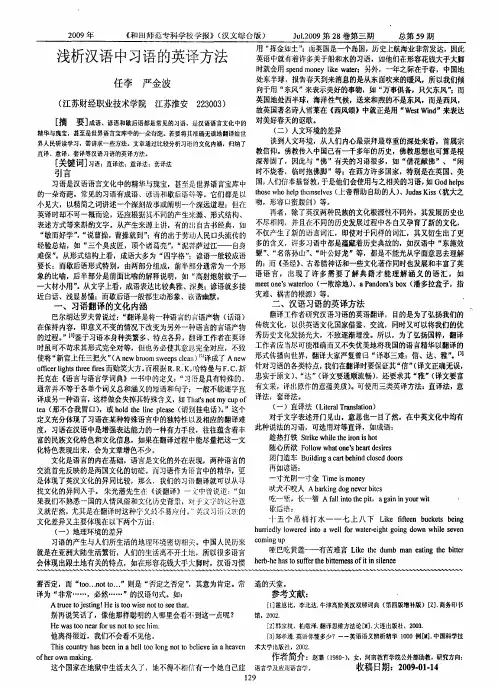
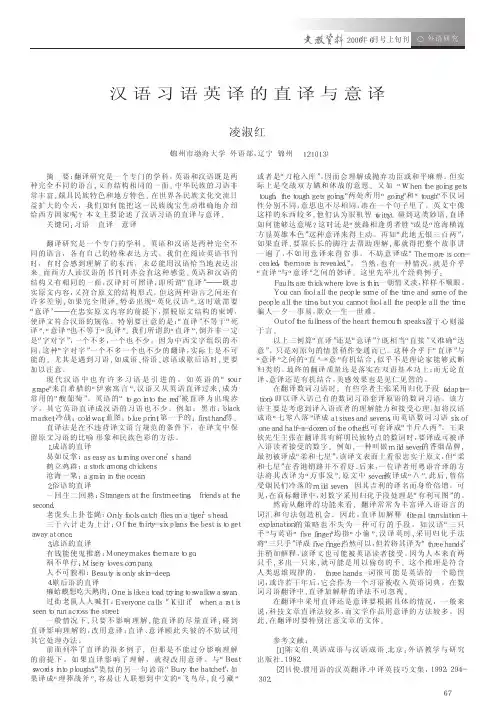
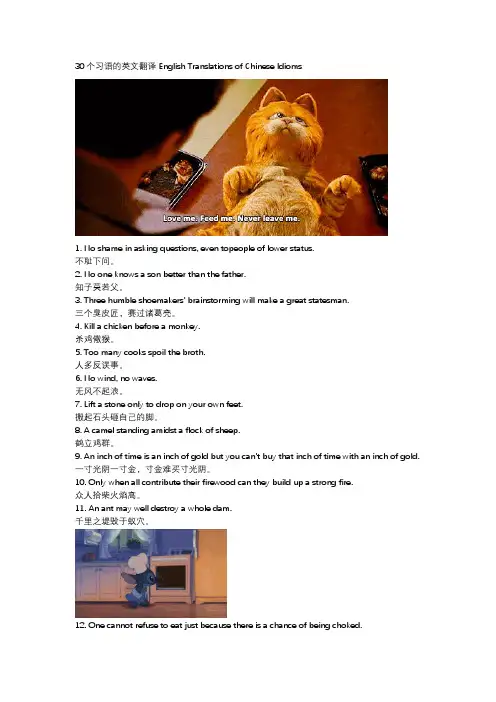
30个习语的英文翻译English Translations of Chinese Idioms1. No shame in asking questions, even topeople of lower status.不耻下问。
2. No one knows a son better than the father.知子莫若父。
3. Three humble shoemakers' brainstormingwill make a great statesman. 三个臭皮匠,赛过诸葛亮。
4. Kill a chicken before a monkey.杀鸡儆猴。
5. Too many cooks spoil the broth.人多反误事。
6. No wind, no waves.无风不起浪。
7. Lift a stone only to drop on your own feet.搬起石头砸自己的脚。
8. A camel standing amidst a flock of sheep.9. An inch of time is an inch of gold but youcan't buy that inch of time with an inch ofgold.一寸光阴一寸金,寸金难买寸光阴。
10. Only when all contribute their firewoodcan they build up a strong fire.众人拾柴火焰高。
11. An ant may well destroy a whole dam.千里之堤毁于蚁穴。
12. One cannot refuse to eat just becausethere is a chance of being choked.因噎废食。
13. If a son is uneducated, his dad is toblame.子不教,父之过。

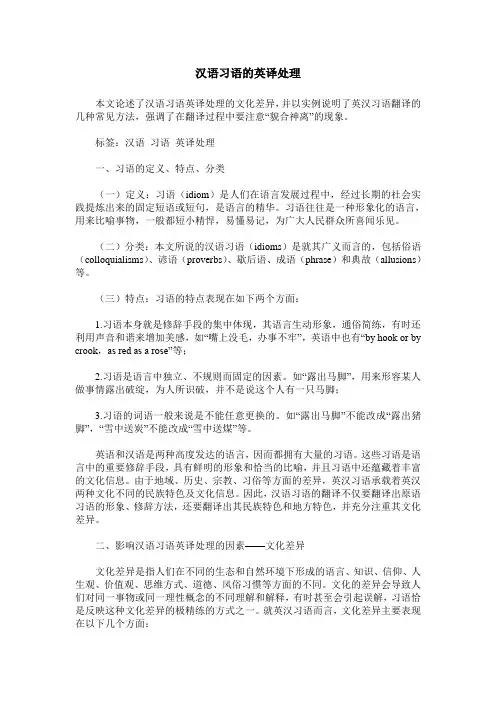
汉语习语的英译处理本文论述了汉语习语英译处理的文化差异,并以实例说明了英汉习语翻译的几种常见方法,强调了在翻译过程中要注意“貌合神离”的现象。
标签:汉语习语英译处理一、习语的定义、特点、分类(一)定义:习语(idiom)是人们在语言发展过程中,经过长期的社会实践提炼出来的固定短语或短句,是语言的精华。
习语往往是一种形象化的语言,用来比喻事物,一般都短小精悍,易懂易记,为广大人民群众所喜闻乐见。
(二)分类:本文所说的汉语习语(idioms)是就其广义而言的,包括俗语(colloquialisms)、谚语(proverbs)、歇后语、成语(phrase)和典故(allusions)等。
(三)特点:习语的特点表现在如下两个方面:1.习语本身就是修辞手段的集中体现,其语言生动形象,通俗简练,有时还利用声音和谐来增加美感,如“嘴上没毛,办事不牢”,英语中也有“by hook or by crook,as red as a rose”等;2.习语是语言中独立、不规则而固定的因素。
如“露出马脚”,用来形容某人做事情露出破绽,为人所识破,并不是说这个人有一只马脚;3.习语的词语一般来说是不能任意更换的。
如“露出马脚”不能改成“露出猪脚”,“雪中送炭”不能改成“雪中送煤”等。
英语和汉语是两种高度发达的语言,因而都拥有大量的习语。
这些习语是语言中的重要修辞手段,具有鲜明的形象和恰当的比喻,并且习语中还蕴藏着丰富的文化信息。
由于地域、历史、宗教、习俗等方面的差异,英汉习语承载着英汉两种文化不同的民族特色及文化信息。
因此,汉语习语的翻译不仅要翻译出原语习语的形象、修辞方法,还要翻译出其民族特色和地方特色,并充分注重其文化差异。
二、影响汉语习语英译处理的因素——文化差异文化差异是指人们在不同的生态和自然环境下形成的语言、知识、信仰、人生观、价值观、思维方式、道德、风俗习惯等方面的不同。
文化的差异会导致人们对同一事物或同一理性概念的不同理解和解释,有时甚至会引起误解,习语恰是反映这种文化差异的极精练的方式之一。
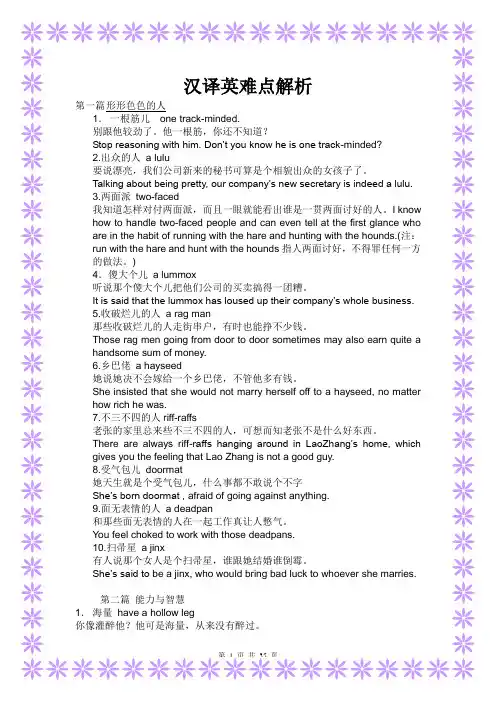
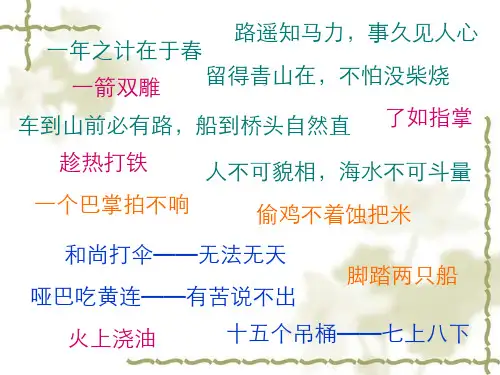
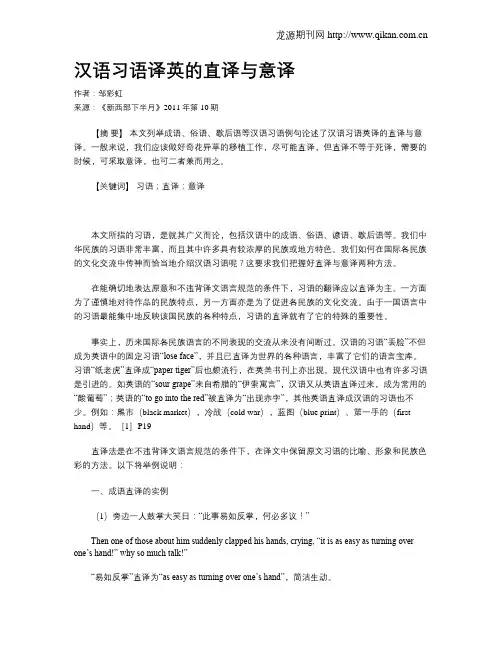
汉语习语译英的直译与意译作者:邹彩虹来源:《新西部下半月》2011年第10期【摘要】本文列举成语、俗语、歇后语等汉语习语例句论述了汉语习语英译的直译与意译。
一般来说,我们应该做好奇花异草的移植工作,尽可能直译,但直译不等于死译,需要的时候,可采取意译,也可二者兼而用之。
【关键词】习语;直译;意译本文所指的习语,是就其广义而论,包括汉语中的成语、俗语、谚语、歇后语等。
我们中华民族的习语非常丰富,而且其中许多具有较浓厚的民族或地方特色。
我们如何在国际各民族的文化交流中传神而恰当地介绍汉语习语呢?这要求我们把握好直译与意译两种方法。
在能确切地表达原意和不违背译文语言规范的条件下,习语的翻译应以直译为主。
一方面为了谨慎地对待作品的民族特点,另一方面亦是为了促进各民族的文化交流。
由于一国语言中的习语最能集中地反映该国民族的各种特点,习语的直译就有了它的特殊的重要性。
事实上,历来国际各民族语言的不同表现的交流从来没有间断过。
汉语的习语“丢脸”不但成为英语中的固定习语“lose face”,并且已直译为世界的各种语言,丰富了它们的语言宝库。
习语“纸老虎”直译成“paper tiger”后也颇流行,在英美书刊上亦出现。
现代汉语中也有许多习语是引进的。
如英语的“sour grape”来自希腊的“伊索寓言”,汉语又从英语直译过来,成为常用的“酸葡萄”;英语的“to go into the red”被直译为“出现赤字”,其他英语直译成汉语的习语也不少。
例如:黑市(black market),冷战(cold war),蓝图(blue print)、第一手的(first hand)等。
[1]P19直译法是在不违背译文语言规范的条件下,在译文中保留原文习语的比喻、形象和民族色彩的方法。
以下将举例说明:一、成语直译的实例(1)旁边一人鼓掌大笑日:“此事易如反掌,何必多议!”Then one of those about him suddenly clapped his hands, crying, “it is as easy as turning over one’s hand!” why so much talk!”“易如反掌”直译为“as easy as turning over one’s hand”,简洁生动。
1.one track-mind 一根筋儿(track [træk] n.轨道;足迹)一个人的心思只往一个方向想stop reasoning with him.don't you know he is one track-mind。
别跟他较劲了。
他一根筋儿,你还不知道吗。
2.a black sheep 败家子(在英文里面是俚语,意思是害群之马,因为黑羊比较廉价,而白羊比较好,一群白羊里面有一只黑羊,表明在一群好的事物之中有个不好的事物,引申出来的意思就是害群之马)splash a big sum.挥霍一大笔钱(splash [splæʃ]溅;婆sum [sʌm]金额)Dick is a black sheep,always bringing trouble to family.3.people of his sort他那号人(sort 种类)how could he think l would go back on my words? l am not his sort,who is fickle and always blowing hot and cold. (fickle[ˈfɪkl]浮躁的,易变的)他怎么知道我会变卦,我可不是他那号人,整天喜怒无常的,说变就变。
4.the salt of the earth 没有坏心眼的人(很有用的俚语,盐在古代就被看得很贵重,被认为是尊贵的象征。
这个俚语出自《新约。
马太福音》耶稣对他的门徒说:“you are the salt of the earth: but if the salt have lost its savor,where with shall it be salted ?你们是世上的盐,盐若失了味,如何才能再咸呢?)所以意思就是中坚力量,精英,高尚的人Alice is really the salt of the earth, she has neither lied to nor harmed anyone.Alice没有一点坏心眼,从来不说谎话,也没做过对不起别人的事。
A· A chain is no stronger than its weakest link. 一着不慎,满盘皆输.· All is not gold that glitters. 闪光的未必都是金子。
· A child is better unborn than untaught. 养不教,父之过。
· Art is long, life is short. 生命短暂,艺术长存。
· A friend is best found in adversity. 患难见真情。
· Although the sun shine, leave not your cloak at home. 未雨绸缪。
· A light heart live long. 心情开朗寿命长。
不恼不愁,活到白头。
· An apple a day keeps the doctor away. 日吃苹果一只,身体健康不求医。
· All covet, all lose. 样样垂涎,样样失落。
贪多嚼不烂。
· A good winter brings a good summer. 瑞雪兆丰年。
· All rivers run into the sea. 殊途同归。
· A small leak will sink a great ship. 千里之堤溃于蚁穴。
· All time is no time when it is past. 机不可失,时不再来。
· A baker's wife may bite of a bun, a brewer's wife may bite of a tun.近水楼台先得月。
· A short cut is often a wrong cut.欲速则不达。
汉语习语英译[不妙]something is to pay经理感到事情有些不妙。
The manager had a hunch that something was to pay.汉语的“有些不妙”或“有点不对头”的概念常可用something is to pay的句式来表示。
这一短语常和feel或have a hunch that连用。
DialogueBob: Didn't you see the writing on the wall?Sue: I even didn't have the slightest hunch.Bob: But you should be prepared for such an outcome.Sue: I had too much confidence in him.Bob: But he ruined your business.Sue: Well, if I knew there would be something to pay, I wouldn't should chalk it up to experience.Bob: Well, you should chalk it up to experience.Sue: You're right.--------------------------------------------------------------------------------[眼中钉]a thorn in someone's flesh不知为什么我成了他们的眼中钉了。
我可从未错待过他们。
I wonder why I become a thorn in their flesh. I've never harmed them.我们说的“眼中钉”与英美人讲的a thorn in someone's flesh指的是一回事,虽比喻有异,但意思相同。
汉语成语英译四法I. 直译法直译法(literal translation)能够保留原文的巧喻及形式,是翻译成语的最好方法。
但直译法必须在不违背译文的语法习惯,又不致引起误解的情况下才能使用。
例如:川流不息→flowing past in an endless stream犬马之劳→to serve like a dog or a horse易如反掌→as easy as turning over one's hand触景生情→the scene brings back memories无可救药→ beyond cureII. 意译法有的成语用直译法无法表达其意,我们只好忍痛割舍原文的巧喻,改以意义(free translation)来翻译。
例如:木已成舟→What's done is done.杞人忧天→unnecessary anxiety东施效颦→ blindly copying others and making oneself look foolish姜太公钓鱼,愿者上钩→Willingly fall into the snare.III.同义成语借用法有的汉语成语在内容和形式上都能够与英语成语相通,这时我们可以用同文的英语习语或成语来翻译汉语成语。
例如:隔墙有耳→ Walls have ears.绞尽脑汁→to rack one's brains一文不名→ without a penny to one's name谋事在人,成事在天→Man proposes, God disposes.说曹操,曹操到→Talk of the evil and he is sure to come.对牛弹琴→to throw pearls before swineIV. 注释法翻译汉语成语时,我们还可采用注释法(explanation),运用该种方法的好处是能介绍本国成语的特色,并能兼顾比喻、形式、清晰各方面。
有朋友建议将这些汉语习语英译汇总一下,所以有了这个帖子,其中有一半是新内容,另一半是原来就贴过的。
【不妙】something is to pay经理感到事情有些不妙。
The manager had a hunch that something was to pay.汉语的“有些不妙”或“有点不对头”的概念常可用something is to pay的句式来表示。
这一短语常和feel或have a hunch that连用。
DialogueBob: Didn't you see the writing on the wall?Sue: I even didn't have the slightest hunch.Bob: But you should be prepared for such an outcome.Sue: I had too much confidence in him.Bob: But he ruined your business.Sue: Well, if I knew there would be something to pay, I wouldn't should chalk it up to experience.Bob: Well, you should chalk it up to experience.Sue: You're right.--------------------------------------------------------------------------------【眼中钉】a thorn in someone's flesh不知为什么我成了他们的眼中钉了。
我可从未错待过他们。
I wonder why I become a thorn in their flesh. I've never harmed them.我们说的“眼中钉”与英美人讲的a thorn in someone's flesh指的是一回事,虽比喻有异,但意思相同。
与此说法相似的还有“刺耳的话”(a flea in someone's ear)。
DialogueFrank: I don't know why I should become a thorn in the John's flesh.Betty: You mean your boss?Frank: Yeah. He seems to bear me a grudge.Betty: That's because you are too much on the ball.Frank: But why should that make him hate me?Betty: That's because you put him in the shade.--------------------------------------------------------------------------------【馋得流口水】make someone's mouth water桌上的美味佳肴馋得他直流口水。
The delicacies on the table make him mouth water.“使某人流口水”指“使某人垂涎”,是地道的汉语口语。
这一概念一般是用make someone mouth water的句式来表达的。
DialogueSue: Wow! What a gracious table! Everything looks so beautiful.Bob: This might be the best dinner you've ever had.Sue: Surely it is. I can hardly wait. They make my mouth water.Bob: I feel itching, too. Let's start and try these delicacies.--------------------------------------------------------------------------------【胡说八道】shooting from the hip他说我迷恋上李丽了?这简直是胡说八道!He thinks I've got the hots for Lily? It's shooting from the hip!汉语口语中的"胡说八道"曾被译成break wind。
其实,英美人更习惯用shoot from the hip来表示这一说法。
DialogueRose: I didn't know Joe was two-faced. He stabbed me in the back.Mark: What did he do?Rose: He told my boyfriend that I had affairs with several men, which, of course, made my boy friend very suspicious of me.Mark: I didn't believe he would shoot from the hip like that! It was very vicious of him. You must not put up with him.Rose: Of course not! He will soon know what he deserves!--------------------------------------------------------------------------------【各奔东西】drift apart毕业后我们班的同学就各奔东西了。
After graduation my classmates drifted apart.“各奔东西”指的是“散开”或“不在一起”的意思,但“散开”或“分散开”的英语是disperse,常指“分散精力”,“疏散人群”或“驱散云雾”等概念。
因而,“各奔东西”不宜使用disperse,而应该用drift apart。
此语中的drift是漂流的意思。
DialogueJohn: What have you been doing these days, mark?Mark: I've been trying to track down some of our old friends.John: I haven't been keeping in touch with them. We simply drifted apart.Mark: We lost track of each other somehow after we graduated.John: Did you ever bump into any of them?Mark: A few Some have settled down, some are tied down, some are living it up and others are in a rut.--------------------------------------------------------------------------------【呕吐】shoot the cat他刚吃完饭就吐了。
He shoot the cat right after the meal.Shoot the cat 是一条俚语,意即vomit。
表示"呕吐"的概念时,除了用shoot, 还可以用jerk,形成jerk the cat的说法。
Sample Sentences1、他告诉医生说他一吃完饭就吐,不知道是为什么。
He told the doctor that he would shoot the cat right after meals without knowing why.2、他又吐了,肯定又喝多了。
He's shooting the cat again. He must have drank too many again.3、她说吃牛肉就吐,但是还特别想吃。
She says she would shoot the cat after eating beef and she doesn't seem to be able to resist eating it.--------------------------------------------------------------------------------【打嗝】make a belch孩子打嗝儿了,让他喝口水吧。
The kid is making a belch. Give him a drink.汉语口语中的“打嗝儿”可以用动词belch来表示,也可以用make a belch的形式。
作为动词使用,belch有“猛烈喷射”、“阵阵冒出”以及“打嗝”等意。
在日常口语中,英美人一般使用make a belch 的说法。
Sample Sentences1、有人说当你打嗝儿时,想想别的事就会好的。
It's said that when you are making a belch, think of something else and the belch will be off.2、你快给他多穿点衣服吧。
他都打嗝了。
He's making a belch. Give him more clothes to make him warm.3、有人说打嗝时喝点儿热水就会好的。
It's said drinking some warm water can help get over the belch.--------------------------------------------------------------------------------【久等】cool one's heels汉语口语中“久等”或“足足等了”之类的概念可以用Cool one's heels来表示。
比如:I have left cooling my heels since seven o'clock.此语源于古时,人们一般骑马外出,当马走的路程太长或太疲惫时,马蹄就会发热,骑马的人必须停下来,让马休息,一直到马蹄凉下来再走。